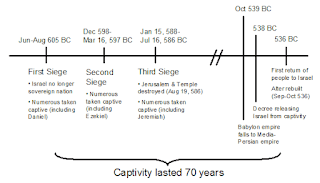Why the pre-exilic account matters
II Chronicles 36:11-21 tells this story in condensed form. Keep in mind this is the fall of the southern kingdom and the northern kingdom had been conquered and dispersed in 712 BC, 126 years before. Details are provided in II Kings 23-24.
Zedekiah (unfaithful) was the third son of Josiah (faithful king) after Jehoahaz (unfaithful) and Jehoiakim(unfaithful). Zedekiah was the last king of Judah (until Christ) as descendant of David. He was blinded and taken away to captivity in the last group to go. Some people, mostly poor, remained.
What were the consequences/contemporary events/after effects?
o Daniel, tells the story of four young men in the first cohort.
o Ezekiel, a prophet in Babylon to the other captives. Interestingly,he refers to Daniel (but not Daniel to Ezekiel). 14:14, 14:20, 28:3. He refers to Daniel as wise and righteousness, which leads me to believe that Daniel was well known and looked up to as a fellow Jew in leadership.
o Jeremiah, prophet who stayed in Jerusalem and was mistreated by his fellow “leftovers.” They wanted to take him to Egypt; they also wanted to lead a rebellion against Nebuchadnezzar (not wise from human standpoint,j ust like in 70 AD against Romans). Jeremiah 29:11, in context, is about them. (29:4-14, not pretty).
Why does this passage of scripture matter today?
1. Because it’s in the Bible. Number of sermons we hear on a passage does not determine its relevance or importance.
2. Because it’s in the Bible two times or more.
3. Because it defined the history of redemption through the Jews, Christ’s ethnic people (although He identified with all peoples and there are many instances of cross-ethnical and cross-cultural conversations in the gospels).
a. How did Jews then respond to the exile? Desire to rebel, assimilation (Esther), and deep mourning (Daniel, see Daniel 9:4 and following—he repeatedly says, “our sins,” “we have sinned.”
b. How do Jews today respond to the exile? Depends. They would say the Old Testament record is clear that it was their national sin of idolatry that caused it, but there is also a sense that it plays into their distinctiveness as a people (they couldn’t be annihilated) and history of persecution that they rise from.
c. From then on, Jews would be in “diaspora” all over the known world, surviving and thriving, even though thousands went back to Judah in the time of Ezra and Nehemiah.
4. Because it proves how amazingly interwoven Scripture is.
a. From Deuteronomy to II Kings this has been the message: obey and worship God faithfully and only, and you will prosper. Become idol-worshippers, and you will be exiled but eventually return after a time.
b. 70 years. (round number). They were supposed to let the soil rest every seven years, and they didn’t for several centuries. This was a time of rest. (God cares about ecology, but not for the same reasons the secularists do. He cares about it because it was His “good” creation (in fullest sense of word) and it is there to provide for humans, not for its own sake. Abuse of the environment eventually hurts humans.
5. Because it shows God uses pagans to teach u in his sovereignty. “Common grace” is a word Presbyterians use. Matt 5: 43-48. Example: Zelensky in Ukraine.
6. Because there are parallels to our own time: red and blue states—but don’t take it too far. The Jews in Judah were probably proud they weren’t taken captive in 712, but it was a matter of time.
7. Because the whole story is eventually about HOPE (Jer. 29:11ff)
8. Because what we rebel againt is not just God’s righteousness but His love and compassion. My idolatry story is an example.
Cncluson: This account from 2500 years ago matters.!


Comments